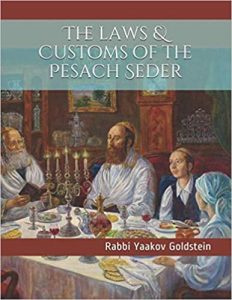[From the letter of the law] all household members and participants can fulfil their obligation of the Haggadah [i.e. Mitzvas Sippur Yetzias Mitzrayim] through listening to the reading of the [Haggadah] which is said by the leader of the house.[2] [Thus, there is no obligation for each individual to read the Haggadah by the Seder table, and they can simply listen to the reading of the leader of the Seder.] Furthermore, this is the most proper [way of fulfilling the Mitzvah of Sippur Yetzias Mitzrayim, which is accomplished through reading the Haggadah, as Mitzvos are initially to be fulfilled together in a public forum] as Berov Am Hadras Melech[3]/G-d is most beautified by a public Mitzvah [and thus it is improper for each individual to separate and fulfill the Mitzvah on his own].[4] [Indeed, this was the old age custom, that the household would listen and be Yotzei the Haggadah with the Baal Habayis.[5] However, some were accustomed for each individual to read the Haggadah quietly to themselves along with the Baal Habayis.[6] Practically, so is the widespread custom today, and so is the Chabad custom.[7]]
| Summary:One fulfills his obligation through listening to the Haggadah reading of the leader of the Seder. Nevertheless, the widespread custom today is for each person to read the Haggadah quietly to themselves. Q&A May a woman read the Haggadah on behalf of others, for them to be Yotzei?It is permitted for a woman to read the Haggadah on behalf of another woman, or children. However, a woman is not to read the Haggadah on behalf of a male above the age of Bar Mitzvah.[8] Thus, those who are accustomed to delegate the saying of the Haggadah to various participants, including women, are to verify [and announce] that every individual is to say the Haggadah quietly to themselves. By a public Seder in which there are commonly participants present who cannot read the Haggadah, one is to make sure that a male recites the Haggadah aloud on behalf of the participants. |
| Reading the Haggadah aloud:[9]Some Gedolei Yisrael were particular to read the Haggadah in a very loud voice, with much enthusiasm and excitement. This is likewise the Chabad custom.[10] See Chapter 4 Introduction! |
[1] Admur 473:24; Shut Hariem 1:41; Olas Shabbos 473:5; Ran Pesachim 25b; Rambam Chametz Umatzah 8:2 and Pesachim 115b “We remove the table only from the person who says the Haggadah”; See Lechem Mishneh and Maaseh Rokeiach on Rambam ibid; Kaf Hachaim 473:135
[2] The reason: As we rule that Shomeia Keoneh, and hence it is considered as if one were to be saying it himself upon hearing it from another. [See Admur 8:11; Hilchos Talmud Torah 2:12; Sukkah 38b]
[3] Mishlei 14:28
[4] Admur ibid in parentheses; Olas Shabbos 473:5; See Admur 8:11; 213:6; 298:20
The reason: Seemingly hearing the Haggadah from the Baal Habayis is similar to fulfilling a single Mitzvah together [as it is like hearing Shofar] and it is hence better for everyone to be Yotzei by hearing from one person, as whenever a Mitzvah is fulfilled collectively, we rule Berov Am Hadras Melech even a Minyan is not present. [See Admur 213:6]
[5] Ran Pesachim ibid
[6] Leket Yosher p. 84; See Sefer Keruv Mimashach on Rambam Chametz Umatzah 8:2 who interprets in Rambam that every individual would say the Haggadah to themselves
[7] Moadim Uzmanim 256; Heard from Harav Eliyahu Landa Shlita; Pesach Chassidi; See Otzer Minhagei Chabad 21
The reason this does not transgress Berov Am Hadras Melech: Seemingly, this follows the same ruling as Admur 619:8 regarding Shehechiyanu, Birchas Hallel and Lulav “Although it is proper to be Yotzei with the Chazan due to Berov Am, nevertheless today …. every person should recite the blessing himself, as in majority of instances the Chazan does not have in mind to be Motzi the congregation.”; So also rules: M”A 619:3; Chayeh Adam 5:17; M”B 8:13 that so is custom; Piskeiy Teshuvos 213:2; See also Admur 167:18 regarding custom to not be Yotzei Hamotzi with Baal Habayis, despite the rule of Berov Am Hadras Melech
[8] Minchas Chinuch 21:6; Chazon Ovadia 2:149 unlike Yechaveh Daas 2:65; Halichos Bas Yisrael 23:26; See P”M 479 A”A 2
The reason: As it is disputed amongst Poskim [See Chapter 1 Halacha 1C] whether women are Biblically or Rabbinically obligated in the Mitzvah of Sippur Yetzias Mitzrayim, and in suspicion of the opinion that they are only Rabbinically obligated, they cannot be Motzi a man who is definitively Biblically obligated. [Poskim ibid; See Admur 271:7; 37:3; 39:1 regarding Tefillin; 55:6; 128:49; 199:9 regarding Birchas Hamazon]
[9] Yifei Laleiv 2:10; Kaf Hachaim 473:127; Siddur Arizal, brought in Likkutei Sichos 22:179; Minhagei Chasam Sofer 10:13; Hagadas Imrei Kodesh in name of Rav Sar Shalom of Belz
[10] Likkutei Sichos 22:179, printed in Shulchan Menachem 2:315; Hisvadyus 5749 page 36; See Otzer Minhagei Chabad Nissan p. 154-155



Leave A Comment?
You must be logged in to post a comment.